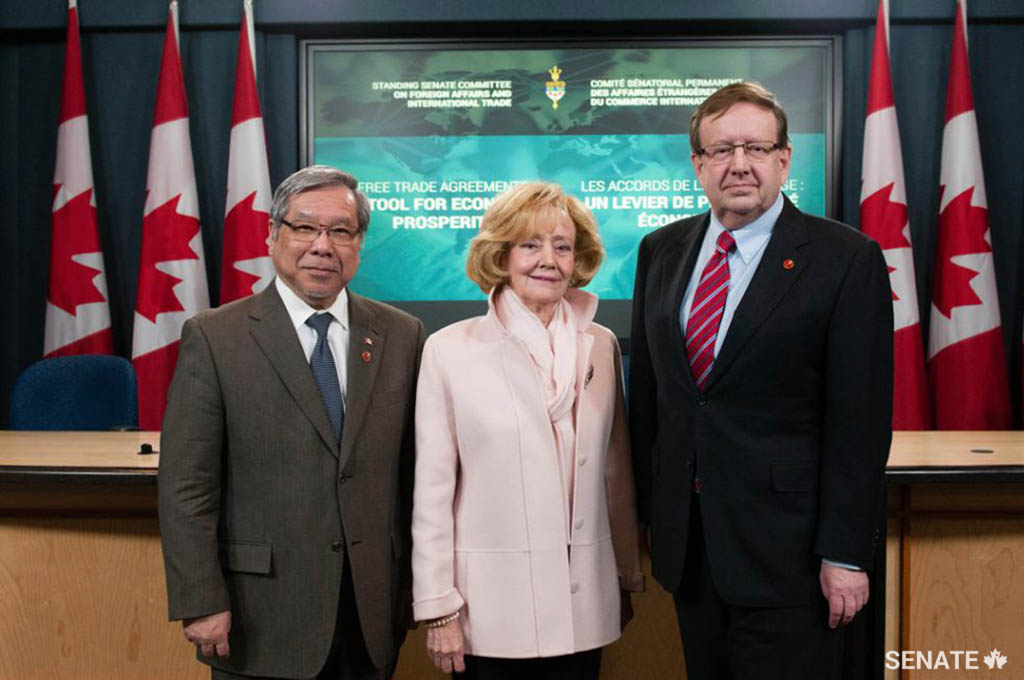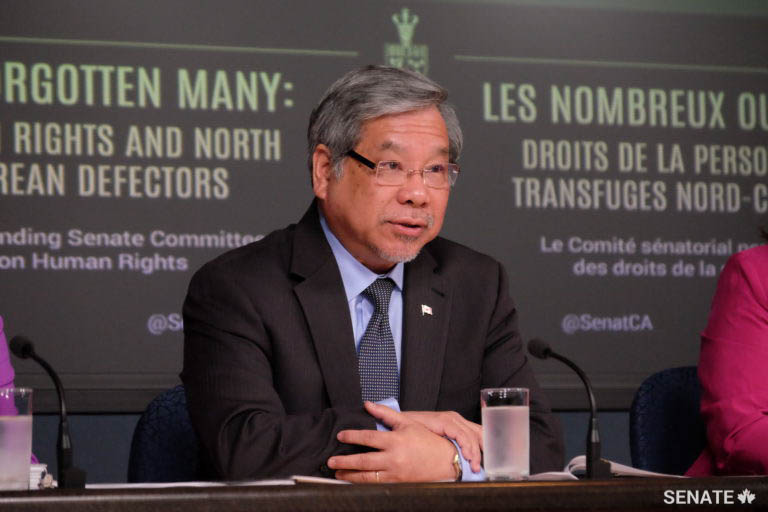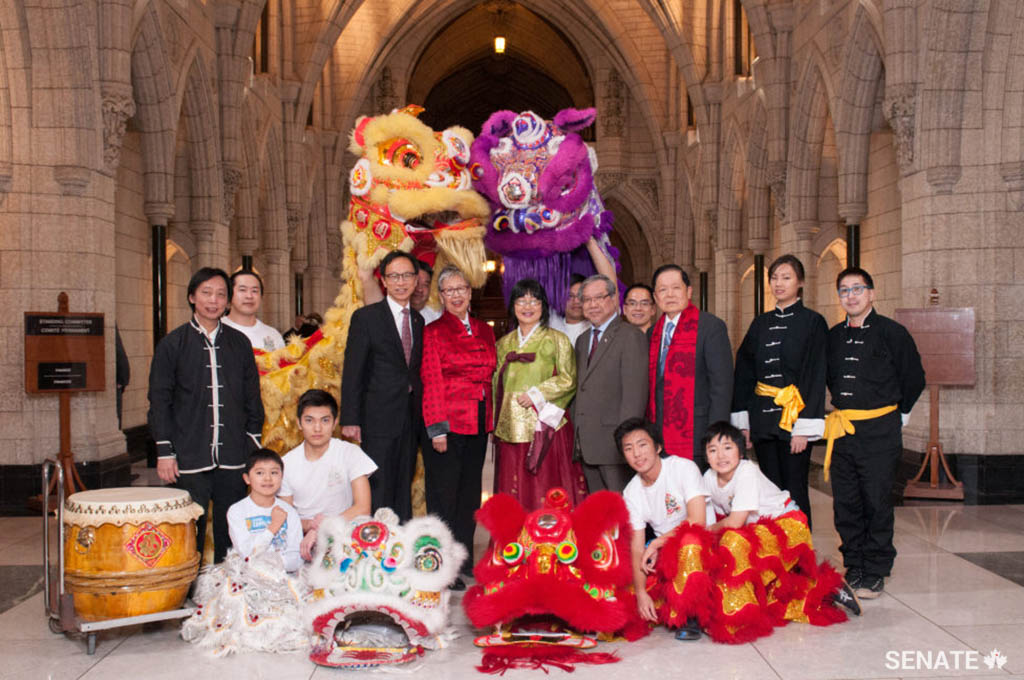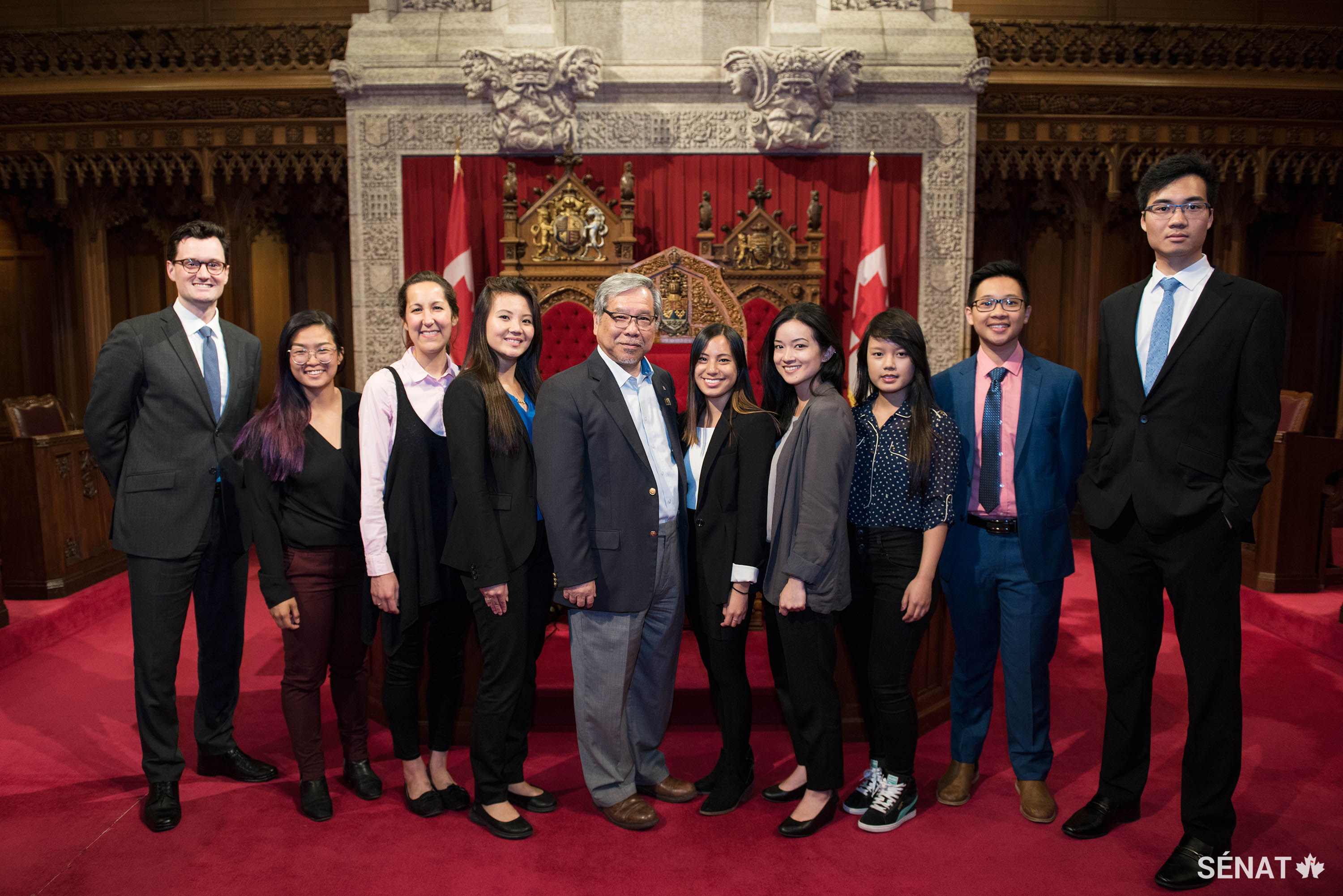Meet Senator Thanh Hai Ngo

The Honourable Senator Thanh Hai Ngo was appointed to the Senate in 2012 on the advice of the Right Honourable Prime Minister Stephen Harper. He is the first Canadian of Vietnamese origin to sit to the Senate. Senator Ngo is a member of the Senate Committee on Foreign Affairs and International Trade, as well as the Senate Committee on Human Rights.
Why was it important for you to choose public service in Canada?
After the fall of Saigon in 1975 and the end of the Vietnam War, millions of Vietnamese refugees were forced to leave their native land and flee the Communist regime. I consider myself blessed to have been among more than 120,000 Vietnamese refugees who escaped torture, assassination, persecution and communist reeducation camps when I arrived in Canada at that time with my wife and children.
Public service is my way of giving back to this country that welcomed us so warmly. I had the privilege of teaching in Ottawa for the Carleton District School Board for close to 30 years and became a citizenship judge in 2007, which allowed me to promote citizenship to schools, multicultural groups, community associations and other organizations. My public advocacy work continues to be a way for me to fight for those who continue to struggle against oppressive regimes in Vietnam and South-East Asia.

How would you describe the importance of the Senate to Canadians?
The Senate today is more relevant than ever. Societies around the world today are experiencing waves of intolerance and discrimination, which serve to undermine democracy. Yet, Canada has remained relatively immune to these influences. I believe this is because we have a political tradition that functions on the basis of openness and fairness. A healthy democracy respects the will of the majority, but also recognizes the rights of minorities. According to Amartya Sen, “democracy is a universal value” which the Senate plays a fundamental role protecting in our democratic system.
What do you believe is Canada’s public-policy priority today?
I believe that Canada needs to develop a strong and focused foreign policy based on principles to effectively address human rights abuses and related issues around the world. I’m proud to live in a country that promotes the fundamental values of freedom, tolerance, and peace. Therefore, we as Canadians need to defend human rights whenever possible and lend our voice to those less fortunate who still face violence and injustice abroad.
What is your proudest achievement during your time at the Senate?
I’m particularly proud of my work that led to the passing of The Journey to Freedom Day Act, which recognizes April 30 of every year as a national day of commemoration of the exodus of Vietnamese refugees and their acceptance in Canada after the fall of Saigon on April 30, 1975. The Journey to Freedom Day commemorates this mass exodus, and helps Canadians gain an understanding of the fundamental role that Canada played, and continues to play, in welcoming thousands of refugees from Vietnam and other countries.

How do you feel that you are making positive change as a senator?
As the first Canadian of Vietnamese origin to sit in the Senate, I feel honoured to advocate for freedom, democracy, and human rights by supporting our government in the fight against oppression in Vietnam and around the world.
As a member of the Senate Committee on Human Rights, my role provides me with a powerful platform to raise awareness of human rights violations both nationally and internationally. I feel strongly that if we can promote understanding and social harmony among our communities, this will lead to positive change in Canada and abroad through incremental changes to our foreign policy, such as strengthening Canada’s sanction regime, modernizing our export control regime and improving how the government reports violation of internationally recognized human right standards.
What is your first and fondest memory of Canada?
When I was faced with the harrowing decision to settle in Canada or the United States, there was an immigration officer who told me that people could skate to work along a canal in Ottawa. As you can imagine, I was astonished and overjoyed by the thought of an entire frozen thoroughfare open to all! I naturally chose Canada and, after all these years, I’m delighted to call the nation’s capital my home.
What do you most enjoy doing with family and friends?
In Vietnamese culture, gatherings amongst friends and family are very important — and usually take place around healthy and spiritually comforting food. Since Vietnamese cuisine is so delicious, there’s nothing I welcome more than sharing a meal with my neighbours and loved ones.

Which book do you believe tells a unique story about Canada?
One book that is close to my heart is called “Running on Empty”. It tells the story of Canada’s humanitarian role during the resettlement of the “Boat People” who were displaced in the aftermath of the Vietnam War after the fall of Saigon in 1975. This is a wonderful account of this moment in history as told from the first hand perspective of Canadian immigration officers who responded to the worst refugee crisis of that century. I welcome Canadians to explore this book if they wish to learn more about Canada’s humanitarian tradition.
What sports team (amateur/professional) do you support?
I mainly enjoy tennis and played for a great many years. To this day, I keep up with our Canadian players and follow the national and world competitions. I would say that my favourite player is Milos Raonic.
How do you envision a healthier and stronger Canadian society?
A healthier and stronger Canadian society is one that fully embraces peace, diversity, respect, and inclusiveness. It’s a society where everyone lives in freedom and dignity, and feels welcome regardless of their language, ethnicity, religion or country of origin. Our strength lies is our kindness and compassion toward others.
How would you like to make a difference to Canadians in the next 5 years?
I would like to engage even more broadly with youth and other minority groups, in the community, in my region and across the country. Many of these groups remain underrepresented and I feel a strong sense of responsibility to bring their voices, issues and perspectives to Parliament. Only then can we say that Canada truly belongs to all Canadians.


Banner photo: Senator Ngo participating in the March of Support for the Monument to the Victims of the Communism (2015).
Note to readers: The Honourable Thanh Hai Ngo retired from the Senate of Canada in January 2022. Learn more about his work in Parliament.
Related articles
Tags
Committee news
Meet Senator Thanh Hai Ngo

The Honourable Senator Thanh Hai Ngo was appointed to the Senate in 2012 on the advice of the Right Honourable Prime Minister Stephen Harper. He is the first Canadian of Vietnamese origin to sit to the Senate. Senator Ngo is a member of the Senate Committee on Foreign Affairs and International Trade, as well as the Senate Committee on Human Rights.
Why was it important for you to choose public service in Canada?
After the fall of Saigon in 1975 and the end of the Vietnam War, millions of Vietnamese refugees were forced to leave their native land and flee the Communist regime. I consider myself blessed to have been among more than 120,000 Vietnamese refugees who escaped torture, assassination, persecution and communist reeducation camps when I arrived in Canada at that time with my wife and children.
Public service is my way of giving back to this country that welcomed us so warmly. I had the privilege of teaching in Ottawa for the Carleton District School Board for close to 30 years and became a citizenship judge in 2007, which allowed me to promote citizenship to schools, multicultural groups, community associations and other organizations. My public advocacy work continues to be a way for me to fight for those who continue to struggle against oppressive regimes in Vietnam and South-East Asia.

How would you describe the importance of the Senate to Canadians?
The Senate today is more relevant than ever. Societies around the world today are experiencing waves of intolerance and discrimination, which serve to undermine democracy. Yet, Canada has remained relatively immune to these influences. I believe this is because we have a political tradition that functions on the basis of openness and fairness. A healthy democracy respects the will of the majority, but also recognizes the rights of minorities. According to Amartya Sen, “democracy is a universal value” which the Senate plays a fundamental role protecting in our democratic system.
What do you believe is Canada’s public-policy priority today?
I believe that Canada needs to develop a strong and focused foreign policy based on principles to effectively address human rights abuses and related issues around the world. I’m proud to live in a country that promotes the fundamental values of freedom, tolerance, and peace. Therefore, we as Canadians need to defend human rights whenever possible and lend our voice to those less fortunate who still face violence and injustice abroad.
What is your proudest achievement during your time at the Senate?
I’m particularly proud of my work that led to the passing of The Journey to Freedom Day Act, which recognizes April 30 of every year as a national day of commemoration of the exodus of Vietnamese refugees and their acceptance in Canada after the fall of Saigon on April 30, 1975. The Journey to Freedom Day commemorates this mass exodus, and helps Canadians gain an understanding of the fundamental role that Canada played, and continues to play, in welcoming thousands of refugees from Vietnam and other countries.

How do you feel that you are making positive change as a senator?
As the first Canadian of Vietnamese origin to sit in the Senate, I feel honoured to advocate for freedom, democracy, and human rights by supporting our government in the fight against oppression in Vietnam and around the world.
As a member of the Senate Committee on Human Rights, my role provides me with a powerful platform to raise awareness of human rights violations both nationally and internationally. I feel strongly that if we can promote understanding and social harmony among our communities, this will lead to positive change in Canada and abroad through incremental changes to our foreign policy, such as strengthening Canada’s sanction regime, modernizing our export control regime and improving how the government reports violation of internationally recognized human right standards.
What is your first and fondest memory of Canada?
When I was faced with the harrowing decision to settle in Canada or the United States, there was an immigration officer who told me that people could skate to work along a canal in Ottawa. As you can imagine, I was astonished and overjoyed by the thought of an entire frozen thoroughfare open to all! I naturally chose Canada and, after all these years, I’m delighted to call the nation’s capital my home.
What do you most enjoy doing with family and friends?
In Vietnamese culture, gatherings amongst friends and family are very important — and usually take place around healthy and spiritually comforting food. Since Vietnamese cuisine is so delicious, there’s nothing I welcome more than sharing a meal with my neighbours and loved ones.

Which book do you believe tells a unique story about Canada?
One book that is close to my heart is called “Running on Empty”. It tells the story of Canada’s humanitarian role during the resettlement of the “Boat People” who were displaced in the aftermath of the Vietnam War after the fall of Saigon in 1975. This is a wonderful account of this moment in history as told from the first hand perspective of Canadian immigration officers who responded to the worst refugee crisis of that century. I welcome Canadians to explore this book if they wish to learn more about Canada’s humanitarian tradition.
What sports team (amateur/professional) do you support?
I mainly enjoy tennis and played for a great many years. To this day, I keep up with our Canadian players and follow the national and world competitions. I would say that my favourite player is Milos Raonic.
How do you envision a healthier and stronger Canadian society?
A healthier and stronger Canadian society is one that fully embraces peace, diversity, respect, and inclusiveness. It’s a society where everyone lives in freedom and dignity, and feels welcome regardless of their language, ethnicity, religion or country of origin. Our strength lies is our kindness and compassion toward others.
How would you like to make a difference to Canadians in the next 5 years?
I would like to engage even more broadly with youth and other minority groups, in the community, in my region and across the country. Many of these groups remain underrepresented and I feel a strong sense of responsibility to bring their voices, issues and perspectives to Parliament. Only then can we say that Canada truly belongs to all Canadians.


Banner photo: Senator Ngo participating in the March of Support for the Monument to the Victims of the Communism (2015).
Note to readers: The Honourable Thanh Hai Ngo retired from the Senate of Canada in January 2022. Learn more about his work in Parliament.


